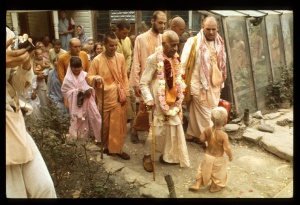SB 4.8.37

A.C. Bhaktivedanta Swami Prabhupada
TEXT 37
- padaṁ tri-bhuvanotkṛṣṭaṁ
- jigīṣoḥ sādhu vartma me
- brūhy asmat-pitṛbhir brahmann
- anyair apy anadhiṣṭhitam
SYNONYMS
padam — position; tri-bhuvana — the three worlds; utkṛṣṭam — the best; jigīṣoḥ — desirous; sādhu — honest; vartma — way; me — unto me; brūhi — please tell; asmat — our; pitṛbhiḥ — by the forefathers, the father and grandfather; brahman — O great brāhmaṇa; anyaiḥ — by others; api — even; anadhiṣṭhitam — not acquired.
TRANSLATION
O learned brāhmaṇa, I want to occupy a position more exalted than any yet achieved within the three worlds by anyone, even by my fathers and grandfathers. If you will oblige, kindly advise me of an honest path to follow by which I can achieve the goal of my life.
PURPORT
When Dhruva Mahārāja refused to accept the brahminical instruction of Nārada Muni, naturally the next question would be what sort of instruction he wanted. So even before Nārada Muni asked, Dhruva Mahārāja expressed his heartfelt desire. His father, of course, was the emperor of the entire world, and his grandfather, Lord Brahmā, was the creator of the universe. Dhruva Mahārāja expressed his desire to possess a kingdom better than those of his father and grandfather. He frankly stated that he wanted a kingdom which had no competitor within the three worlds, namely the higher, middle and lower planetary systems. The greatest personality within this universe is Lord Brahmā, and Dhruva Mahārāja wanted a position even greater than his. He wanted to take advantage of Nārada Muni's presence because he knew very well that if Nārada Muni, the greatest devotee of Lord Kṛṣṇa, could bless him or show him the path, then certainly he would be able to occupy a more exalted position than any person within the three worlds. Thus he wanted help from Nāradajī to achieve that position. Dhruva Mahārāja wanted a position greater than that of Brahmā. This was practically an impossible proposition, but by pleasing the Supreme Personality of Godhead a devotee can achieve even the impossible.
One particular point mentioned here is that Dhruva Mahārāja wanted to occupy an exalted position not by hook or by crook, but by honest means. This indicates that if Kṛṣṇa offered him such a position, then he would accept it. That is the nature of a devotee. He may desire material gain, but he accepts it only if Kṛṣṇa offers it. Dhruva Mahārāja was sorry to refuse the instruction of Nārada Muni; therefore he requested him to be merciful to him by showing a path by which he could fulfill his mind's desires.